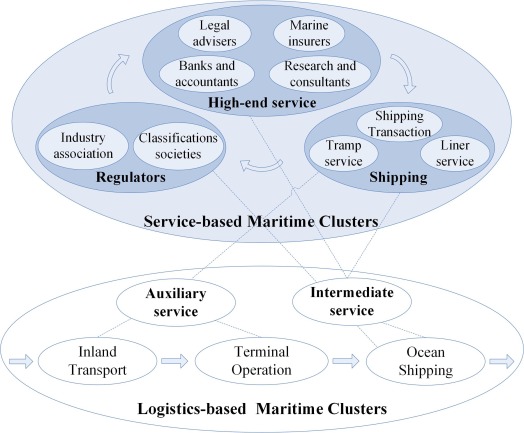The Role of Policies in Supporting the Development of Marine Logistics Industry Clusters
DOI:
https://doi.org/10.62012/collaborate.v2i1.64Keywords:
Industrial Cluster, Maritime Logistics, Government Policy, Infrastructure, Human Resources, Regulations, Stakeholder Coordination.Abstract
The maritime logistics industry cluster plays an important role in supporting global trade and international supply chains. The development of this industrial cluster can provide significant economic benefits, such as increased productivity, innovation and competitiveness. However, the formation and growth of the maritime logistics industry cluster does not occur automatically and requires government policy support. This research aims to explore the role of government policy in supporting the development of the maritime logistics industry cluster. The research methods used include literature studies, policy analysis, case studies, surveys, and data triangulation. The research results identify various policy instruments that can be used by the government, such as infrastructure development, fiscal incentives, supportive regulations, human resource training programs, investment promotion, and collaboration between stakeholders. However, policy implementation also faces challenges such as coordination between stakeholders, prioritization of infrastructure investment, development of skilled human resources, and an effective regulatory framework. The recommendations put forward include increasing coordination between stakeholders, targeted infrastructure investment, human resource training and education programs, and strengthening the regulatory framework. This research provides valuable insights for policy makers, industry players, academics and other stakeholders in efforts to develop a strong and sustainable maritime logistics industry cluster.
Downloads
References
M. G. Langen, "Maritime Logistics: A Perspective," in Maritime Logistics: A Complete Guide to Effective Shipping and Port Management, Kogan Page, 2019, pp. 1-20.
International Maritime Organization, "International Shipping Facts and Figures," [Online]. Available: https://www.imo.org/en/OurWork/Pages/ShipsAndShippingFactsAndFigures.aspx. [Accessed: 15-May-2024].
M. E. Porter, "Clusters and the New Economics of Competition," Harvard Business Review, vol. 76, no. 6, pp. 77-90, 1998.
European Commission, "The Role of Cluster Initiatives in Fostering the Competitiveness of Maritime Sector," [Online]. Available: https://op.europa.eu/en/publication-detail/-/publication/f5e5e0cd-eb6a-11e8-b690-01aa75ed71a1/language-en. [Accessed: 15-May-2024].
Organisation for Economic Co-operation and Development (OECD), "Clusters and Cluster Policies," [Online]. Available: https://www.oecd.org/cfe/clusters/clustersandclusterpolicies.htm. [Accessed: 15-May-2024].
T. J. Donahue, "Government Policies to Strengthen Clusters," in Clusters in a Cold Climate: Innovation Dynamics in a Diverse Economy, McGill-Queen's University Press, 2018, pp. 99-120.
Maritime and Port Authority of Singapore, "Singapore's Maritime Cluster," [Online]. Available: https://www.mpa.gov.sg/web/portal/home/maritime-singapore/introduction-to-maritime-singapore/singapore-maritime-cluster. [Accessed: 15-May-2024].
Port of Rotterdam, "Rotterdam: Europe's Leading Maritime Cluster," [Online]. Available: https://www.portofrotterdam.com/en/doing-business/logistics/logistics-hub. [Accessed: 15-May-2024].
United Nations Conference on Trade and Development, "Maritime Logistics and the Blue Economy:Challengesand,"[Online].Available:https://unctad.org/system/files/officialdocument/aldc2022d1_en.pdf. [Accessed: 15-May-2024].
N. Muammar dan A. Mosyofa, “KEBIJAKAN MARITIM INDONESIA DALAM MENUNJANG SISTEM KEAMANAN TRANSPORTASI LAUT”, SENSISTEK, vol. 7, no. 1, hlm. 46-50, Mei 2024.


















